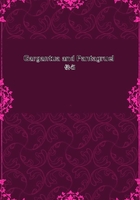
第337章
How Gaster invented means to get and preserve corn.
Those gastrolatrous hobgoblins being withdrawn, Pantagruel carefully minded the famous master of arts, Gaster. You know that, by the institution of nature, bread has been assigned him for provision and food; and that, as an addition to this blessing, he should never want the means to get bread.
Accordingly, from the beginning he invented the smith's art, and husbandry to manure the ground, that it might yield him corn; he invented arms and the art of war to defend corn; physic and astronomy, with other parts of mathematics which might be useful to keep corn a great number of years in safety from the injuries of the air, beasts, robbers, and purloiners; he invented water, wind, and handmills, and a thousand other engines to grind corn and to turn it into meal; leaven to make the dough ferment, and the use of salt to give it a savour; for he knew that nothing bred more diseases than heavy, unleavened, unsavoury bread.
He found a way to get fire to bake it; hour-glasses, dials, and clocks to mark the time of its baking; and as some countries wanted corn, he contrived means to convey some out of one country into another.
He had the wit to pimp for asses and mares, animals of different species, that they might copulate for the generation of a third, which we call mules, more strong and fit for hard service than the other two. He invented carts and waggons to draw him along with greater ease; and as seas and rivers hindered his progress, he devised boats, galleys, and ships (to the astonishment of the elements) to waft him over to barbarous, unknown, and far distant nations, thence to bring, or thither to carry corn.
Besides, seeing that when he had tilled the ground, some years the corn perished in it for want of rain in due season, in others rotted or was drowned by its excess, sometimes spoiled by hail, eat by worms in the ear, or beaten down by storms, and so his stock was destroyed on the ground; we were told that ever since the days of yore he has found out a way to conjure the rain down from heaven only with cutting certain grass, common enough in the field, yet known to very few, some of which was then shown us. I took it to be the same as the plant, one of whose boughs being dipped by Jove's priest in the Agrian fountain on the Lycian mountain in Arcadia, in time of drought raised vapours which gathered into clouds, and then dissolved into rain that kindly moistened the whole country.
Our master of arts was also said to have found a way to keep the rain up in the air, and make it to fall into the sea; also to annihilate the hail, suppress the winds, and remove storms as the Methanensians of Troezene used to do. And as in the fields thieves and plunderers sometimes stole and took by force the corn and bread which others had toiled to get, he invented the art of building towns, forts, and castles, to hoard and secure that staff of life. On the other hand, finding none in the fields, and hearing that it was hoarded up and secured in towns, forts, and castles, and watched with more care than ever were the golden pippins of the Hesperides, he turned engineer, and found ways to beat, storm, and demolish forts and castles with machines and warlike thunderbolts, battering-rams, ballists, and catapults, whose shapes were shown to us, not over-well understood by our engineers, architects, and other disciples of Vitruvius;as Master Philibert de l'Orme, King Megistus's principal architect, has owned to us.
And seeing that sometimes all these tools of destruction were baffled by the cunning subtlety or the subtle cunning (which you please) of fortifiers, he lately invented cannons, field-pieces, culverins, bombards, basiliskos, murdering instruments that dart iron, leaden, and brazen balls, some of them outweighing huge anvils. This by the means of a most dreadful powder, whose hellish compound and effect has even amazed nature, and made her own herself outdone by art, the Oxydracian thunders, hails, and storms by which the people of that name immediately destroyed their enemies in the field being but mere potguns to these. For one of our great guns when used is more dreadful, more terrible, more diabolical, and maims, tears, breaks, slays, mows down, and sweeps away more men, and causes a greater consternation and destruction than a hundred thunderbolts.